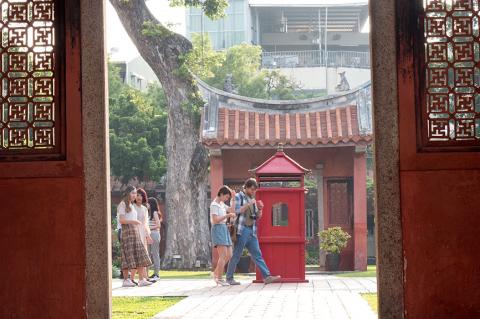Audiences will be able to see the beauty of Tainan on the silver screen when director Hsu Ching-chu’s (徐慶珠) latest film, When Green Turns to Gold (最是橙黃橘綠時), hits theaters on Jan. 11.
The inspiration behind the film and its title came from a poem by Song Dynasty poet-statesman Su Dongpo (蘇東坡), Hsu said.
The film tells the story of two 25-year-old friends with different personalities who leave their homes to study and work in a foreign place, she said.

Photo: CNA
Set in the 1990s, the film was shot in a variety of locations, including Tainan, Taitung County and Kagoshima, Japan.
On Monday, Hsu and one of the film’s lead actresses, Lee Yi-chieh (李亦捷), returned to Tainan to talk about their experiences filming in the city.
They held a news conference at the Tainan Cultural and Creative Park (台南文化創意產業園區), a Japanese colonial-era government building that has been designated a monument by the city.
Nearly half of the scenes in When Green Turns to Gold were shot in Tainan, said the Audiovisual Support Center of the Tainan City Government’s Cultural Affairs Bureau, which subsidized the film.
The center said filming took place at locations including Anping Fort (安平古堡); the Eternal Golden Castle (億載金城); the Confucius Temple (孔廟); a former village for police officers and their dependents; National Cheng Kung University; Hutoupi Scenic Area (虎頭埤風景區); Ciaotou Beach Park (橋頭海灘公園); and Blue Dragon Art Company (蔚龍藝術).
In the film, Lee plays a character who works at National Cheng Kung University’s Foreign Language Center, it added.

DEFENSE: The National Security Bureau promised to expand communication and intelligence cooperation with global partners and enhance its strategic analytical skills China has not only increased military exercises and “gray zone” tactics against Taiwan this year, but also continues to recruit military personnel for espionage, the National Security Bureau (NSB) said yesterday in a report to the Legislative Yuan. The bureau submitted the report ahead of NSB Director-General Tsai Ming-yen’s (蔡明彥) appearance before the Foreign and National Defense Committee today. Last year, the Chinese People’s Liberation Army (PLA) conducted “Joint Sword-2024A and B” military exercises targeting Taiwan and carried out 40 combat readiness patrols, the bureau said. In addition, Chinese military aircraft entered Taiwan’s airspace 3,070 times last year, up about

The Overseas Community Affairs Council (OCAC) yesterday announced a fundraising campaign to support survivors of the magnitude 7.7 earthquake that struck Myanmar on March 28, with two prayer events scheduled in Taipei and Taichung later this week. “While initial rescue operations have concluded [in Myanmar], many survivors are now facing increasingly difficult living conditions,” OCAC Minister Hsu Chia-ching (徐佳青) told a news conference in Taipei. The fundraising campaign, which runs through May 31, is focused on supporting the reconstruction of damaged overseas compatriot schools, assisting students from Myanmar in Taiwan, and providing essential items, such as drinking water, food and medical supplies,

STRICTER ENFORCEMENT: Taipei authorities warned against drunk cycling after a sharp rise in riding under the influence, urging greater public awareness of its illegality Taipei authorities have issued a public warning urging people not to ride bicycles after consuming alcohol, following a sharp rise in riding under the influence (DUI) cases involving bicycles. Five hundred and seven people were charged with DUI last year while riding YouBikes, personal bicycles, or other self-propelled two-wheelers — a fourfold increase from the previous year, data released by the Taipei Police Department’s Traffic Division showed. Of these, 33 cases were considered severe enough to be prosecuted under “offenses against public safety,” the data showed. Under the Road Traffic Management and Penalty Act (道路交通管理處罰條例), bicycles — including YouBikes and other

A magnitude 4.3 earthquake struck eastern Taiwan's Hualien County at 8:31am today, according to the Central Weather Administration (CWA). The epicenter of the temblor was located in Hualien County, about 70.3 kilometers south southwest of Hualien County Hall, at a depth of 23.2km, according to the administration. There were no immediate reports of damage resulting from the quake. The earthquake's intensity, which gauges the actual effect of a temblor, was highest in Taitung County, where it measured 3 on Taiwan's 7-tier intensity scale. The quake also measured an intensity of 2 in Hualien and Nantou counties, the CWA said.